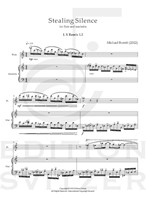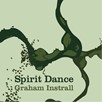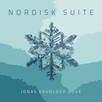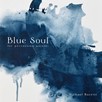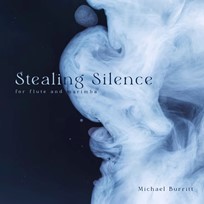
Stealing Silence
Composer: Michael Burritt
Instrument: Flute and Marimba
Level: Advanced
Published: 2023
Price: €30.00
Item details
-
Description +
-
Performing artists Justin Alexander (marimba) and Tabatha Easley (flute)
Stealing Silence was written for the renowned flutist Bonita Boyd, Professor of Flute at the Eastman School of Music. The first movement, X remix, is a reworking of material that I previously used for a solo piece and wanted to explore it in the chamber setting. It is characterized by animated musical language with frequent syncopation creating with energetic and bouncy dialogue between the marimba and flute. Movement 2 is an evocative ballad and greatly influenced by the music of the American composer Alec Wilder, and his beautiful work for marimba flute. The final movement, Flashback, is a fun romp between the two instruments employing a pseudo- blues scale, creating a sort of swagger in its musical countenance.
-
-
Instrumentation +
-
Flute and Marimba
-
-
About the composer +
-
Having performed in four continents and more than forty states, Michael Burritt is one of his generation's most accomplished percussionists. He is in frequent demand performing concert tours and master classes throughout the United States, Europe, Asia, Australia and Canada. Mr. Burritt has been soloist with the United States Air Force Band, Dallas Wind Symphony, Omaha Symphony, Chautauqua Symphony Orchestra, Richmond Symphony Orchestra, Nexus, Third Coast Percussion, Ju Percussion Group (Taiwan), Percussion Art Quartet (Germany) and the Amores Percussion Group (Spain). Mr. Burritt has three solo as well as numerous chamber recordings. In 2018 he recorded his Home Trilogy with the world renown percussion group Nexus and is soon to release a new recording of solo and chamber works by Alejandro Viñao with the Grammy Award winning Third Coast Percussion. Burritt recently premiered Fast Forward, Chamber Concerto commissioned for him in celebration of the centennial of the Eastman School of Music by Pulitzer Prize winning Composer Joseph Schwantner.
He has been a featured artist at nine Percussive Arts Society International Conventions. In 1992 he presented his New York solo debut in Weill Hall at Carnegie Hall and in 1998 performed his London debut in the Purcell Room at Queen Elizabeth Hall. Mr. Burritt has extensive chamber and orchestral experience and has performed with the Chicago Chamber Musicians, The Chicago Symphony, Nexus, Third Coast Percussion and The Peninsula Music Festival Orchestra.
Mr. Burritt is also active as a composer, with three concertos to his credit as well as numerous solo and chamber works for marimba and percussion. His works for solo marimba have become standard repertoire for the instrument and are frequently required repertoire on international competitions. Commissions include The World Marimba Competition in Stuttgart Germany, The Paris International Marimba Competition, Nexus and Paris Percussion Group. Zildjian recently commissioned Mr Burritt to compose a 30 minute work in celebration of the company’s 400 years anniversary in 2023. Mr. Burritt is published with Keyboard Percussion Publications, C. Alan, Masters Music and Innovative Percussion. Burritt is also an artist/clinician and product design/consultant for Malletech, where he has developed his own line of marimba mallets and the MJB Signature Marimba. He is an artist/educational clinician with the Zildjian Company and Evans Drum Heads and Yamaha Drums. Mr. Burritt is currently the President of Percussive Arts Society, was a member of the Board of Directors from 1996 - 2008, was a contributing editor for Percussive Notes Magazine from 1991 – 2006 and was chairman of the PAS Keyboard Committee from 2004 – 2010.
Mr. Burritt is currently holds the Paul J. Burgett Distinguished Professorship and is Professor of Percussion at The Eastman School of Music where he is only the third person in the history of the school to hold this position. Prior to his appointment at Eastman, Mr. Burritt was Professor of Percussion at Northwestern University from 1995-2008 where he developed a program of international distinction. Mr. Burritt received his Bachelor and Master of Music Degrees, as well as the prestigious Performers Certificate from the Eastman School of Music in Rochester, New York.
-
-
Reviews +
-
Review (Percussive Notes, June 2024)
Marimba and flute are a popular duo combination, and “Stealing Silence” is a nice advanced addition to the repertoire. It has Michael Burritt’s distinctive compositional flavor that will be familiar to fans of his work. The marimba part is quick and challenging with continuous notes that utilize the full expanse of the 5-octave instrument. Syncopated accents pop out of the texture and interlock with the flute part. The two players pass lines back and forth, often dovetailing.
The marimba part requires adept four-mallet playing and a quick facility around the board. The piece is in danger of sounding muddy if the player is not precise with phrasing, accents, articulation, and rhythm. The changing meters mean that both players have to know how the parts fit together and must have an excellent sense of time. The flute part likewise requires an advanced player who has experience with ensemble playing.
Burritt doesn’t use a key signature, but rather mixed accidentals on the staff with plenty of chromaticism. Excellent reading skills and attention to detail are a must as the marimba score switches between a single treble staff, single bass staff, and the grand staff. There are plenty of written dynamics to go with the articulations. It may be advisable for the players to memorize this piece due to length and complexity.
“Stealing Silence” would be a nice addition to a graduate recital or marimba/flute duo concert. The piece provides plenty of challenges for even advanced players.
—Marilyn K. Clark Silva
-
-
Credits +
-
Front Cover Artwork: Nicola Lee
Printed in Copenhagen, Denmark
Copyright © Edition SVITZER
www.editionsvitzer.com
With support from Koda’s Cultural Funds
-
